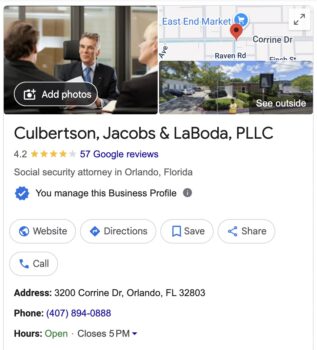TABLE OF CONTENTS
- 1 What Keywords Should Law Firms Target for SEO?
- 2 Prioritize Local SEO to Boost Visibility
- 3 Create a Content Strategy That Aligns with Client Needs
- 4 How Can Law Firms Improve Website UX for SEO?
- 5 Build High-Quality Backlinks for Authority
- 6 Track Performance and Adapt as Needed
- 7 Case Study: Criminal Defense Law Firm Local SEO Success
- 8 FAQ: Digital Marketing for Law Firms
- 9 Build Your Online Presence with South Street & Co.
Law firm SEO is one of the most effective ways for attorneys to attract new clients online. These law firm SEO tips show you how to improve rankings, visibility, and client inquiries
A well-crafted SEO strategy can transform your law firm’s digital footprint by increasing your visibility in search results and drawing in new clients. These straightforward SEO tips for law firms can help your practice climb the rankings (even if you have offices in multiple cities), improve organic traffic, and engage visitors more effectively.
What Keywords Should Law Firms Target for SEO?
Keyword optimization is crucial to any successful SEO strategy. Law firms should target keywords relevant to both their practice areas and clients’ search intent. Include specific, geo-targeted keywords that describe your services (e.g., “family law attorney” or “personal injury lawyer”). Long-tail keywords like “how to choose a personal injury attorney” or “affordable divorce attorney near me” can capture clients further in their decision-making process.
Using a mix of short, popular keywords and more niche, specific terms can help broaden your reach and drive high-quality and relevant traffic.
Prioritize Local SEO to Boost Visibility
Local SEO for Florida law firms is essential if you’re seeking to reach clients in your vicinity. Ensure your Google Business Profile (GBP) is complete and accurate, including your contact information, office hours, services, and location. Adding high-quality images and posting regular updates can further enhance your GBP, making it a valuable tool for attracting new clients.
To strengthen your local presence, encourage satisfied clients to leave positive reviews, which can improve your firm’s ranking and credibility. Additionally, list your firm on reputable legal directories (like Avvo or FindLaw) and local business directories for a more extensive online footprint.
Create a Content Strategy That Aligns with Client Needs
Content marketing helps you demonstrate authority and build trust with potential clients by answering their common questions and concerns. Consider developing content for each stage of the client journey:
- Awareness Stage: Create blog posts addressing general legal concerns, such as “Do I Need a Personal Injury Lawyer?”
- Consideration Stage: Offer in-depth information on legal services, like “What to expect during a family lawconsultation.”
- Decision Stage: Share case studies, testimonials, and service pages to highlight successful client outcomes and your firm’s unique approach.
By providing valuable content at every stage, you increase your chance of engaging potential clients and guiding them toward taking action.
How Can Law Firms Improve Website UX for SEO?
An optimized website can significantly improve both user experience and SEO rankings. Ensure your site is easy to navigate, mobile-friendly, and fast-loading. Use clear headings, structured menus, and intuitive navigation to guide visitors through your services.
Optimize on-page elements, including page titles, meta descriptions, and alt tags, to provide search engines with more information about your content. Incorporating CTAs (calls-to-action) in relevant sections, such as “Schedule a Consultation” or “Learn More About Our Practice Areas,” can further guide visitors through your site and encourage engagement.
Build High-Quality Backlinks for Authority
Backlinks from reputable websites show search engines that your site is a trusted authority. Reach out to legal directories, contribute articles to law-related publications, and consider partnerships with industry sites for relevant and high-quality backlinks. Law firms can earn backlinks by sponsoring bar associations or publishing insights in state legal publications.
Focus on building links from sites with domain authority and a solid reputation to maximize the impact on your SEO. Avoid low-quality links, as search engines may penalize sites with dubious backlinking practices.
Track Performance and Adapt as Needed
SEO is an evolving field, so tracking performance and refining your strategy is essential. Use tools like Google Analytics and Google Search Console to monitor organic traffic, bounce rates, and keyword performance. Regularly analyze these metrics to identify which strategies drive traffic and conversion and make data-driven adjustments to stay competitive.
Monitoring site performance can help you optimize content, improve keyword focus, and adjust to any algorithm changes to keep your site ranking effectively over time.
Case Study: Criminal Defense Law Firm Local SEO Success
- Client Challenge: A newly launched criminal defense law firm in Eastern Florida had zero website traffic and no visibility in a highly competitive market.
- Strategic Approach: South Street & Co. performed a full SEO audit, competitor research, and keyword analysis. We then optimized site structure, user experience, navigation, and built 12 focused service pages with targeted local keywords. continuous monitoring and refinement followed.
- Key Results (Month 1):
- Sessions rose from 0 to 148
- Ranked in the top 100 for 25 keywords
- Achieved top 3 rankings on Google for 7 local keywords
This rapid early performance demonstrates how a focused local SEO strategy—even on a brand-new site—can drive meaningful visibility and engagement for criminal defense attorneys.
FAQ: Digital Marketing for Law Firms
Why is law firm marketing different from other industries?
Attorneys face unique challenges because every state bar has strict advertising guidelines. Unlike other businesses, law firms cannot simply call themselves the “best” or guarantee results in their ads. Marketing strategies must stay compliant while still helping firms stand out online.
Which digital marketing channels deliver the best results for law firms?
SEO and Google Ads are usually the most effective since most people start their search for an attorney online. Local SEO, strong content marketing, and reputation management (like generating reviews) are also critical for building trust and visibility.
How soon can law firms expect to see results from SEO?
Most firms start noticing gains in 3–6 months, though competitive markets may take longer. Targeted strategies like local SEO can produce quicker wins, helping firms show up in the Google Map Pack and connect with clients faster.
Is social media worthwhile for attorneys?
Yes, but it requires a careful approach. Social platforms help attorneys share thought leadership and connect with potential clients, but content must avoid promises of specific outcomes or language that could be considered misleading under bar rules.
Why is local SEO so important for attorneys?
Because most clients are searching for legal help nearby. Local SEO helps firms appear in map results and local searches, making it easier for potential clients to call or visit right when they need representation.
Build Your Online Presence with South Street & Co.
Need help implementing these law firm SEO tips? Our team offers specialized SEO services for law firms to improve visibility, drive traffic, and convert potential clients.
Download our checklist of law firm SEO tips here.
Our law firm SEO experts will design and execute an SEO strategy customized to meet your unique goals and help you reach clients more effectively. Contact us today for a complimentary marketing analysis and start growing your firm’s online presence.







